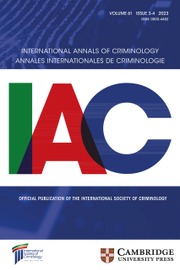Article contents
Artificial Intelligence and Innovation in Brazilian Justice
Published online by Cambridge University Press: 23 March 2021
Abstract
Artificial intelligence can bring benefits to legal practice, providing agility and precision. It can allow judicial decisions to be the result of the combination of algorithms, enabling the development of a system based on machine learning. This article seeks to demonstrate the current state of the use of artificial intelligence in the Brazilian justice system with the impact of the development of a deep learning system, merely the result of the automation of textual analyses of legal cases, which now serve as models. Reflection is more than necessary given the ethical issues that can arise in view of the inherent precepts that are usually impregnated in the judicial function. Civil servants, lawyers, prosecutors and judges should be guided by a pertinent regulation of new technologies and reflect on whether judicial decisions would be the result of human thinking or not, in addition to the risk that they can carry when the models are biased, in good or bad faith, due to erroneous classification or misinformation in the system.
Abstracto
La inteligencia artificial puede aportar beneficios a la práctica jurídica, aportando agilidad y precisión. Puede permitir que las decisiones judiciales sean el resultado de la combinación de algoritmos, permitiendo el desarrollo de un sistema basado en el aprendizaje automático. Este artículo busca demostrar el estado actual del uso de la inteligencia artificial en el Sistema de Justicia Brasileño con el impacto del desarrollo de un sistema de aprendizaje profundo, meramente resultado de la automatización de análisis textuales de casos legales, que ahora sirven como modelos. La reflexión es más que necesaria dadas las cuestiones éticas que pueden surgir ante los preceptos inherentes que suelen estar impregnados en la función judicial. Los funcionarios, abogados, fiscales y jueces deben guiarse por una normativa pertinente de las nuevas tecnologías y reflexionar sobre si las decisiones judiciales serían el resultado del pensamiento humano o no, además del riesgo que pueden acarrear cuando los modelos son sesgados, en de buena o mala fe, debido a la clasificación errónea o desinformación al sistema.
Abstrait
L’intelligence artificielle peut apporter des avantages à la pratique juridique, en apportant agilité et précision. Elle peut permettre aux décisions judiciaires d’être le résultat de la combinaison d’algorithmes, permettant le développement d’un système basé sur l’apprentissage automatique. Cet article cherche à démontrer l’état actuel de l’utilisation de l’intelligence artificielle dans le Système Judiciaire Brésilien avec l’impact du développement d’un système d’apprentissage profond, simplement le résultat de l’automatisation des analyses textuelles des affaires juridiques, qui servent désormais de modèles. La réflexion est plus que nécessaire étant donné les problèmes éthiques qui peuvent se poser compte tenu des préceptes inhérents généralement imprégnés de la fonction judiciaire. Les fonctionnaires, les avocats, les procureurs et les juges devraient être guidés par une réglementation pertinente des nouvelles technologies et réfléchir à la question de savoir si les décisions judiciaires seraient le résultat d’une réflexion humaine ou non, en plus du risque qu’elles peuvent comporter lorsque les modèles sont biaisés, en bonne ou mauvaise foi, en raison de la classification erronée ou de la désinformation du système.
抽象的
人工智能可以为法律实践带来好处,并提供敏捷性和准确性。它可以使司法判决成为算法组合的结果,从而可以开发基于机器学习的系统。本文旨在通过深度学习系统的发展来证明巴西司法系统中人工智能的使用现状,而这仅仅是对法律案例进行文本分析的自动化的结果,而该案例现在已成为模型。考虑到通常会渗透到司法职能中的内在戒律,考虑到可能出现的道德问题,思考是不必要的。公务员,律师,检察官和法官应受有关新技术法规的指导,并反思司法裁决是否将是人类思想的结果,除了在模型有偏见时他们可能承担的风险之外,归因于系统的错误分类或错误信息。
خلاصة
يمكن للذكاء الاصطناعي أن يجلب فوائد للممارسة القانونية ، ويوفر المرونة والدقة. يمكن أن تسمح للقرارات القضائية بأن تكون نتيجة مزيج من الخوارزميات ، مما يتيح تطوير نظام يعتمد على التعلم الآلي. تسعى هذه المقالة إلى إظهار الحالة الحالية لاستخدام الذكاء الاصطناعي في نظام العدالة البرازيلي مع تأثير تطوير نظام التعلم العميق ، مجرد نتيجة لأتمتة التحليلات النصية للقضايا القانونية ، والتي تعمل الآن كنماذج. يعتبر التأمل أكثر من ضروري بالنظر إلى القضايا الأخلاقية التي يمكن أن تنشأ في ضوء المبادئ المتأصلة التي عادة ما تكون مشربة في الوظيفة القضائية. يجب أن يسترشد موظفو الخدمة المدنية والمحامون والمدعون العامون والقضاة باللوائح ذات الصلة للتقنيات الجديدة والتفكير فيما إذا كانت القرارات القضائية ستكون نتيجة للتفكير البشري أم لا ، بالإضافة إلى المخاطر التي يمكن أن يتحملوها عندما تكون النماذج متحيزة حسن النية أو سوء النية بسبب التصنيف الخاطئ أو المعلومات الخاطئة للنظام.
Keywords
- Type
- Article
- Information
- Copyright
- © International Society of Criminology 2021
References
- 3
- Cited by




